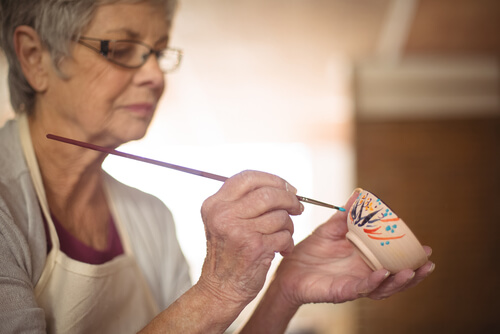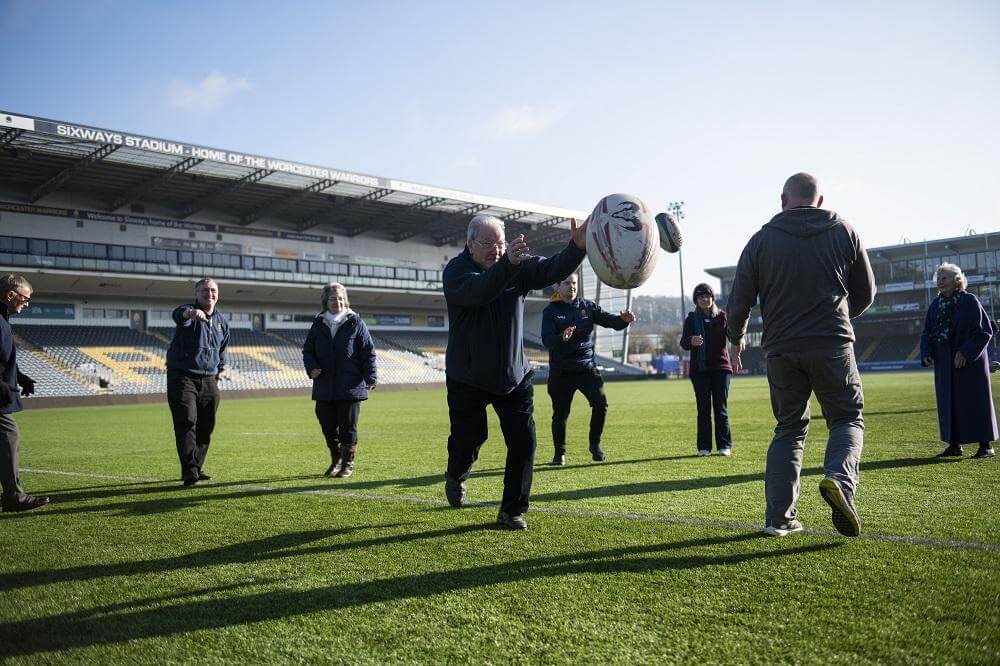
Page contents
What’s the benefit of dementia-friendly activities?
Engaging in meaningful activities has a range of benefits for people living with dementia. As well as creating opportunities for you to continue doing things you enjoy, activities can also encourage time spent with loved ones. It can also help you to retain skills affected by dementia.
Taking part in dementia activities can give you a sense of purpose. This is so often lost within the condition, helping to boost a person’s self-esteem and confidence.
If you have dementia or are caring for someone who does, there are lots of activities to get involved in.
Home-based dementia-friendly activities
If you have dementia, home can be even more poignant, as the outside world presents additional challenges.
Staying at home doesn’t have to mean sitting on the sofa all day. There are still lots of dementia-friendly tasks and activities that can be enjoyed from the comfort of home.
Some examples include:
Housework
This might not sound like an ‘activity’ as such. Many of us spend our days lamenting the chores we have to do, from washing up to doing the laundry. However, for people with dementia these tasks can be really beneficial.
Not only does housework allow a person to take control of their own space but household chores can add a sense of purpose and routine to the day. For example, if putting a load in the washing machine is a regular morning task, continuing to do this can help you pinpoint that time of day. It is also a great way to get some light exercise without stepping a foot in the gym.
Cooking
With the right assistance, cooking can still be a really enjoyable activity. It can help give a sense of routine, stimulate memories and engage different senses.
Whether trying new recipes or sticking with old favourites, cooking is a nice way to spend time with a loved one.
Gardening
Gardening has a range of benefits including promoting physical health, helping with relaxation and stimulating the senses. Whether it’s lighter tasks such as watering plants, planting new shrubs or creating a water feature, there are so many ways to continue enjoying gardening. In autumn and winter, tasks can be focused on keeping the garden tidy by sweeping up leaves or even planting bulbs in preparation for the next season.
Reminiscence
Reminiscence activities are based on encouraging a person to recall memories from their past. It can involve simple conversations about things like pets, favourite foods or stories from the school days. You can create memory boxes filled with photos, letters or paraphernalia from times gone by to spark memories.
The benefit of reminiscence is that many people with dementia struggle with short term memory but are able to recall long term memories. Reliving these memories can help to build confidence whilst also showing the person that they are valued and loved.
Dementia-friendly activities outside the home
If your loved one prefers to get out and about, there are different activities available to suit individual interests.
Sports
There’s no doubt that physical activity is beneficial to everyone. This is no exception for people living with dementia. As well as helping to combat physical ailments such as high blood pressure and heart disease, physical activity can also help to retain muscle mass, promote dexterity and even improve sleep.
If somebody is already involved in a sport, it’s good for them to continue this, but it’s also equally as beneficial to try something new.
Sports could include:
- Swimming
- Walking
- Dance
- Yoga
There may be classes offering options for varied abilities or catering specifically for people living with dementia. It’s a good idea to research what’s on offer where you live to find somewhere that’s suited to your specific requirements.
The ‘Our Tackling Dementia’ group
In Worcester, the Worcester Warriors rugby club hosts the ‘Our Tackling Dementia’ group. It supports people living with dementia in the local area to get involved with physical activity.
Beginning as a Dementia Café with only five members, the group has expanded to offer a range of activities to suit everyone, including tennis and rugby.
Simon Northcott is Worcester Warrior’s BME and disability lead and organises the ‘Our Tackling Dementia’ group. He commented:
“The regulars join the weekly fun with their carers for a chance to pick up the ball and play rugby, tennis, or simply enjoy the company and relax. There is no pressure and that’s the way they like it.
“Some people are unenthusiastic about joining the group saying, ‘this isn’t for me’. I remember one person had no spark and didn’t want to ‘hang out’ with much older people. But after accepting a position as a volunteer, he found his place in the group. He now acts as a concierge, greeting people and making sure that everyone is happy and having fun.
“That’s why we formed this club, as a safe place where people who are living with dementia can find their own way.“

Speaking about Andrew, a member of the group, Mr Northcott said:
“Andrew is a…perfect example of how people flourish when they are encouraged to see what they can do at our Dementia Café.
“Andrew had never played rugby before, but he joined in a mixed ability rugby session. He grabbed the ball, ran the length of the pitch and scored a try. It didn’t matter that they were just playing in a little box in the middle of the pitch. What mattered was that he loved the thrill of scoring a try and the warmth he got from the rugby family.”
The arts
Whether it be music, film or theatre, the arts play a big part in many people’s lives, signifying key moments and sparking memories from the happiest of times.
Although the perception of the world can change with the progression of dementia, there’s no reason why someone shouldn’t continue to enjoy all that the arts has to offer.
For example, dementia-friendly screenings are offered in selected cinemas and theatres across the UK and are a great way for people living with dementia at any stage to continue to enjoy the cinema in a more accessible way. The availability will differ depending on your local area, but dementia-friendly screenings include things like:
- Catered film choices – for example, old classics rather than the current box office favourites
- Clear signage
- Dementia-trained staff
- Adjusted lighting or sound
For people who are more into music, there are a number of clubs and groups across the UK which offer the chance to get involved.
Singing for the Brain
Singing for the Brain, run by Alzheimer’s Society, offers the opportunity for people living with dementia to get together and sing their favourite songs. As well as being mood-boosting and great for mental wellbeing, these singing groups provide an inclusive environment where people feel safe. They are are encouraged to meet new friends.
To find your closest Singing for the Brain group, visit the website here.
Creative activities
There are many different ways to express your own creative flair. A creative outlet can help to reduce stress, give a sense of purpose and boost confidence.
Depending on a person’s interests, they could attend classes or groups including:
- Painting
- Drawing
- Pottery
- Crafting
- Scrapbooking
- Flower arranging
Many of these tasks can also be done at home. So if, for any reason, you don’t fancy or are unable to attend classes, consider buying the resources to enjoy a creative task of your choice from the comfort of your home.
Activities for the later stages of dementia
As dementia progresses, it may inevitably become more difficult for a person to engage with the activities they enjoy, but it isn’t impossible.
With support, activities can easily be amended to suit a person’s changing capabilities. Clear instructions and demonstrations may help with cooking, for example. Being accompanied by another person can ensure there is no risk to safety.
Although accepting that adjustments are necessary can be challenging, making these modifications will help to maintain quality of life. It provides experiences that offer enjoyment and contentment in a world that can often feel foreign and inaccessible.


